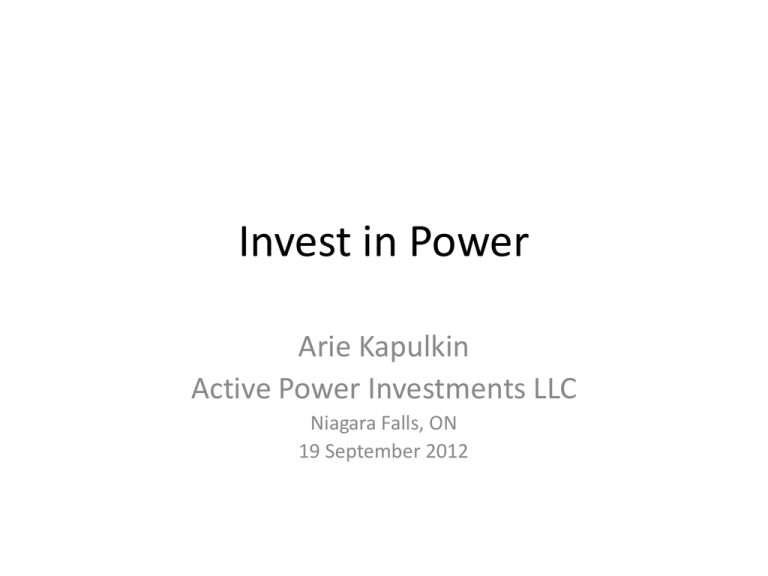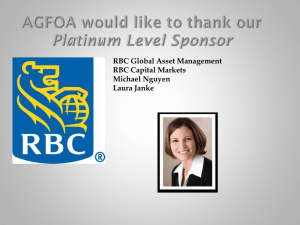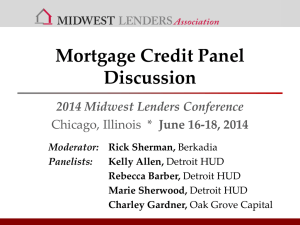
Invest in Power
Arie Kapulkin
Active Power Investments LLC
Niagara Falls, ON
19 September 2012
Outline
• Overview of Energy Trading
• Development of Nodal Power Markets
• Financial trading in Nodal Power Markets
• Risk Management
• Opportunities for investors
• Conclusions
Copyright © 2012 by Active Power Investments LLC
All Rights Reserved
2
What is Energy Trading?
• A purchase or sale of energy, paper or physical, for consumption
or resale
• Purchase or sale for consumption or resale in the very short
time frame refers to spot energy trading; energy trading in the
future refers to futures/forwards
• Why Trade? Energy Trading results in realization of gains from
trade – there is no different from other trading of commodities
or goods
• Examples include: oil, gas, power, coal, emissions, weather, etc.;
all these commodities can be traded
• We can trade products and their derivatives; derivatives are
instruments that derive their value from the underlying product
Copyright © 2012 by Active Power Investments LLC
All Rights Reserved
3
Traded Products:
Temporal Dimension
• Spot (cash) market is same hour/day (Example:
Real-Time (RT)) for immediate production or
consumption
• Day Ahead (DA) is a type of the short-term hourly
or block-based forward market for the next day
• Futures or forward market is trading for some
remote time period
• Examples: balance of the month, prompt month,
3 to 5 years out Henry Hub on NYMEX
Copyright © 2012 by Active Power Investments LLC
All Rights Reserved
4
Traded Products:
Spatial Dimension
• Energy is traded worldwide
• Oil is traded on major energy exchanges: NY Harbor,
WTI – Cushing, Gulf Coast, North Sea, Singapore
• Gas is traded at Henry Hub in LA and AECO in
Alberta and a number of secondary gas hubs;
Ze Brugge terminal in Europe, etc.
• Electricity is traded at great many locations due to
its local production and consumption nature: All
over the world (Example: Electricity Hubs in the US)
Copyright © 2012 by Active Power Investments LLC
All Rights Reserved
5
Copyright © 2012 by Active Power Investments LLC
All Rights Reserved
6
Where is Energy Traded?
• One-to-one: individual bilateral deals
• Many-to-one: marketers
• Model pioneered by Enron
• Requires the company to actively match buyers and sellers
• Many-to-many: ICE, Nodal Exchange, Futures Markets
• Platform to enable clearing b/w multiple participants
• Organized power markets
• New ways to transact: central clearing of locational bids by system
operators (ISOs and RTOs)
Copyright © 2012 by Active Power Investments LLC
All Rights Reserved
7
Outline
• Overview of Energy Trading
• Development of Nodal Power Markets
• Financial trading in Nodal Power Markets
• Risk Management
• Opportunities for investors
• Conclusions
Copyright © 2012 by Active Power Investments LLC
All Rights Reserved
8
Theory
CUSTOMERS
customer
service
distribution
transmission
generation
IPP
self-generation
Copyright © 2012 by Active Power Investments LLC
All Rights Reserved
9
self-generation
generation
IPP
transmission
distribution
customer
service
CUSTOMERS
Copyright © 2012 by Active Power Investments LLC
All Rights Reserved
Practice
10
Transition
customer
service
distribution
transmission
generation
ancillary srvcs
Copyright © 2012 by Active Power
Investments LLC
All Rights Reserved
11
Power Marketing and
Energy Trading Explosion
• Utilities, financial houses, marketers, brokers,
generating entities, and speculators are
buying, selling, and swapping power/energy
on an ever-increasing scale
• The total volume of trade is multiples of the
value of the underlying commodity
• Power marketing / brokering has grown
tremendously since the start of deregulation
Copyright © 2012 by Active Power Investments LLC
All Rights Reserved
12
North American
Regional Transmission Organizations
Copyright © 2012 by Active Power Investments LLC
All Rights Reserved
13
Move from the Zonal To FNM – Nodal
Market
NP15
ZP26
SP15
• Full Network Model (All constraints
• No intra-zonal constraints enforced
• Internal Congestion Zones –
Constraints enforced between zones
enforced)
• Locational Marginal Pricing at each node
Copyright © 2012 by Active Power Investments LLC
All Rights Reserved
14
Why Nodal?
• Efficiency: minimization of production cost
– System-wide, incentive-compatible
• Advanced locational signal for buyers and
sellers to match next day needs and supplies
• Economic signal (LMP) to Gens and Demand
Response while protecting load
• Congestion risk management (CRR/FTR/TCC)
and transmission planning
Copyright © 2012 by Active Power Investments LLC
All Rights Reserved
15
Locational Marginal Prices in Nodal
Markets
Copyright © 2012 by Active Power Investments LLC
All Rights Reserved
16
Outline
• Overview of Energy Trading
• Development of Nodal Power Markets
• Financial trading in Nodal Power Markets
• Risk Management
• Opportunities for investors
• Conclusions
Copyright © 2012 by Active Power Investments LLC
All Rights Reserved
17
Financial Instruments
• Virtual Trading: trade DAM vs. RTM
– Virtual Supply (Financial Generator): sell DA buy
RT
– Virtual Demand (Financial Load): buy DA sell RT
• Congestion Revenue Rights (aka FTR or TCC)
– Buy or sell congestion between two nodes
– Buy in monthly/seasonal, settle in DAM
Copyright © 2012 by Active Power Investments LLC
All Rights Reserved
18
Virtuals as Purely Financial Instruments
• Used to capture the price difference between
DAM and RTM at a location
• If the location price in DAM is expected to be
greater than RTM, then an Inc at that location
would be the correct tool
• If the location price in DAM is expected to be
less than RTM, then a Dec at that location
would be the correct tool
Copyright © 2012 by Active Power Investments LLC
All Rights Reserved
19
Incs and Decs as Financial Instruments
Inc Payoff ($)
P1
DA
RT1
•
RT2
RT LMP ($)
Dec Payoff ($)
P2
P2
RT1
•DA
RT LMP ($)
RT2
P1
Copyright © 2012 by Active Power Investments LLC
All Rights Reserved
20
FTR/CRR/TCC: Traffic Power
Copyright © 2012 by Active Power Investments LLC
All Rights Reserved
21
Regular Congestion
Copyright © 2012 by Active Power Investments LLC
All Rights Reserved
22
Extreme Congestion
Copyright © 2012 by Active Power Investments LLC
All Rights Reserved
23
FTR Properties
• Financial settlement, no physical delivery
• Can be acquired centrally or from another
participant
• Can be bought or sold b/w any two pricing
locations (aka injection and withdrawal
points, or source and sink) defining a path
• Can cover on-peak or off-peak
• FTR payoff can be either positive or negative
Copyright © 2012 by Active Power Investments LLC
All Rights Reserved
24
Financial Perspective
• Hedgers: offset the expected congestions
• Speculators: look for most profitable paths
• Look at FTRs as a stand-alone financial
instrument
• Purchase Forward Contract for congestion
difference at a set price
• Delivery is based upon DAM price differences
Copyright © 2012 by Active Power Investments LLC
All Rights Reserved
25
Financial Perspective cont.
• Goal of FTR spec bids: Buy the FTR in the
auction at less than the total amount of the
congestion revenue which will be paid to the
FTR holder throughout the auction period
• These financial instruments could be thought
of as investments that get future “earnings”
Copyright © 2012 by Active Power Investments LLC
All Rights Reserved
26
Outline
• Overview of Energy Trading
• Development of Nodal Power Markets
• Financial trading in Nodal Power Markets
• Risk Management
• Opportunities for investors
• Conclusions
Copyright © 2012 by Active Power Investments LLC
All Rights Reserved
27
FTR Holder Risks
• FTR Holder purchased an FTR with
anticipation of congestion happening in one
direction
• Actual system conditions can change from
auction assumptions
• System conditions and DA market clearing can
be different than holder’s assumptions
Copyright © 2012 by Active Power Investments LLC
All Rights Reserved
28
VaR: Portfolio Mapping
East Portfolio
West Portfolio
Copyright © 2012 by Active Power Investments LLC
All Rights Reserved
29
VaR and Electricity
• Market Prices have relatively short histories compared to
financial indexes
• Price distribution: Fat tails, Outliers, Price Jumps in spot
prices
• High Volatilities, Unstable Correlations
Copyright © 2012 by Active Power Investments LLC
Rights Reserved
All
30
Oil & Gas Impact
Copyright © 2012 by Active Power Investments LLC
All Rights Reserved
31
Stress Testing
• Focus on potential sources of risk that
– Impact the portfolio seriously
– Have not occurred in the recent past
• No standard/scientific way to reliably measure risk
– Scenarios tailored to the portfolio
• Stress testing looks for the worst outcome in contrast
to VaR which looks at extreme movements in price
distribution
• Stress testing is more effective when the portfolio has
fewer sources of risk
Copyright © 2012 by Active Power Investments LLC
All Rights Reserved
32
Outline
• Overview of Energy Trading
• Development of Nodal Power Markets
• Financial trading in Nodal Power Markets
• Risk Management
• Opportunities for investors
• Conclusions
Copyright © 2012 by Active Power
Investments LLC
All Rights Reserved
33
Recent and future developments
• CA
• TX (ERCOT)
• SPP
Copyright © 2012 by Active Power
Investments LLC
All Rights Reserved
34
Why invest in power nodal markets?
• New less efficient markets, higher spreads
• Higher barriers to entry (talent, data, analysis,
process, ISO / regulatory compliance)
• Uncorrelated with equity, debt, FX, real estate
• No to very low correlation with other energy
commodities such as oil or NG
• Multiple independent power markets –
diversification of opportunities
Copyright © 2012 by Active Power Investments LLC
All Rights Reserved
35
Daily Price Comparison NG - Power
6
500
Correlation: 0.0516
(Pearson linear correlation coefficient)
450
5
400
350
4
3
250
$/MWh
$/MMBtu
300
200
2
150
100
1
50
0
0
Carthage
HUB_North
Copyright © 2012 by Active Power
Investments LLC
All Rights Reserved
36
60
8
S&P 500 vs SP15 MCC - NP15 MCC
Correlation: 0.004
6
40
4
20
0
1/1/2010
2/1/2010
3/1/2010
4/1/2010
5/1/2010
6/1/2010
7/1/2010
8/1/2010
9/1/2010
10/1/2010
11/1/2010
$/MWh
$
2
12/1/2010
0
-20
-2
-40
-4
-60
-6
S&P 500
MCC Spread
Copyright © 2012 by Active Power
Investments LLC
All Rights Reserved
37
Key Points and Conclusions
• Virtual Offers/Bids
– Prediction of RT price with some degree of
accuracy is a must to achieve the goal
– Diversification across pricing points is a key factor
– Offers financial participants risk premiums when
arbitraging DA – RT price differences
Copyright © 2012 by Active Power Investments LLC
All Rights Reserved
38
Key Points and Conclusions
• FTR –Congestion patterns change over time
– Short-term congestion is harder to predict
(month-to-month, day-to-day)
– Long-term congestion may be more predictable
but does change based on new
generation/transmission construction (or
retirements)
– FTRs are a tool that can provide profitable
opportunities for financial participants
Copyright © 2012 by Active Power Investments LLC
All Rights Reserved
39
Questions?
Copyright © 2012 by Active Power Investments LLC
All Rights Reserved
40









